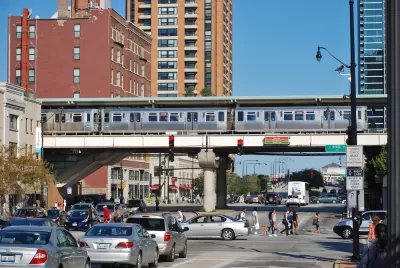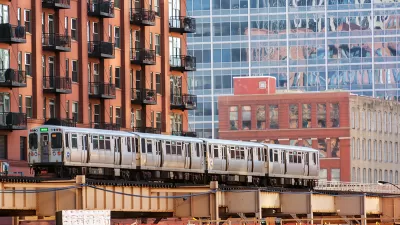The first-of-it’s kind study found that without public transit, Chicago would lose an estimated $35 billion in economic activity annually and the quality of life of residents, particularly women and low-income groups, would take a major hit.

An article from Eureka Alert outlines a new study by the U.S. Department of Energy’s Argonne National Laboratory and MIT that looks at the role the public transit system plays in Chicago — and what would happen if it were eliminated. “The research, presented at a Chicago Transit Authority board meeting in May, identifies major consequences, including increased vehicle congestion, reduced economic activity and a disproportionate impact on underserved communities and minorities,” the article reads.
Researchers say the study is the first they know of to quantify transit value across multiple metrics, which they achieved by modeling a day in Chicago without public transit using Argonne’s POLARIS transportation simulation tool. In addition, “The study assumed that households who did not currently own a car as well as those who owned only one would need to purchase additional vehicles, leading to a 30% increase in vehicle car ownership and causing an economic burden on those households.” They found travel times would increase from around 25 to 34 minutes and speeds would decrease by 14 percent in both urban and suburban areas. Results also revealed reduced access to opportunities would lead people — in particular women and low-income groups — to simply cancel activities, around two million activities daily, which would result in an estimated $35 billion annual loss in economic activity. Overall, the study found that for every $1 invested in transit, $13 in economic activity is created, in addition to travel time savings, increased access to opportunities, and lower vehicle emissions and the resulting health benefits.
The analysis comes as CTA, like many major transit networks across the city after the pandemic, faces major budgetary and operational challenges. Local news outlet WGN9 recently reported ridership has only recovered by 60 percent compared to prepandemic levels, driven by severe service cuts, reliability issues, and staffing shortages. With the expiration of federal COVD relief, the region’s transportation agencies — CTA, Pace, and Metra — face a projected 2026 budget gap of $730 million if additional revenue streams are not secured.
FULL STORY: Argonne-led study highlights public transit’s critical role across Chicago

Alabama: Trump Terminates Settlements for Black Communities Harmed By Raw Sewage
Trump deemed the landmark civil rights agreement “illegal DEI and environmental justice policy.”

Planetizen Federal Action Tracker
A weekly monitor of how Trump’s orders and actions are impacting planners and planning in America.

The 120 Year Old Tiny Home Villages That Sheltered San Francisco’s Earthquake Refugees
More than a century ago, San Francisco mobilized to house thousands of residents displaced by the 1906 earthquake. Could their strategy offer a model for the present?

In Both Crashes and Crime, Public Transportation is Far Safer than Driving
Contrary to popular assumptions, public transportation has far lower crash and crime rates than automobile travel. For safer communities, improve and encourage transit travel.

Report: Zoning Reforms Should Complement Nashville’s Ambitious Transit Plan
Without reform, restrictive zoning codes will limit the impact of the city’s planned transit expansion and could exclude some of the residents who depend on transit the most.

Judge Orders Release of Frozen IRA, IIJA Funding
The decision is a victory for environmental groups who charged that freezing funds for critical infrastructure and disaster response programs caused “real and irreparable harm” to communities.
Urban Design for Planners 1: Software Tools
This six-course series explores essential urban design concepts using open source software and equips planners with the tools they need to participate fully in the urban design process.
Planning for Universal Design
Learn the tools for implementing Universal Design in planning regulations.
Clanton & Associates, Inc.
Jessamine County Fiscal Court
Institute for Housing and Urban Development Studies (IHS)
City of Grandview
Harvard GSD Executive Education
Toledo-Lucas County Plan Commissions
Salt Lake City
NYU Wagner Graduate School of Public Service




























